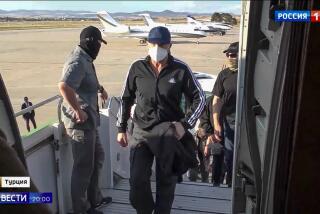Switzerland to Extradite Former Moscow Official to Russia
- Share via
MOSCOW — A former Russian atomic energy minister arrested on embezzlement charges in Switzerland will be extradited to his homeland rather than the United States, a court said Thursday, ending a fierce tug of war between Moscow and Washington.
The decision by the Swiss Federal Court in Lausanne overturns an October ruling that Yevgeny Adamov should be extradited to the United States to face charges of money laundering, conspiracy to transfer stolen money and securities, tax evasion and conspiracy to defraud the United States.
Russian politicians and media had portrayed the U.S. extradition request as an effort to gather nuclear intelligence, smear Russia’s image and perhaps collect damaging information about other top Moscow officials.
Adamov was arrested on a U.S. warrant while visiting his daughter in Switzerland in the spring; after he was detained, Russian authorities filed corruption charges against him and sought his extradition. The effort was widely seen as an attempt to keep Adamov, Russia’s nuclear energy minister from 1998 to 2001, out of American hands.
“We are satisfied with the decision,” Russian Foreign Ministry spokesman Mikhail Kamynin said after Thursday’s ruling, the Russian news agency Interfax reported. The U.S. Embassy in Switzerland issued a statement expressing disappointment.
“For Russia, this is an important diplomatic victory,” said Vladimir A. Orlov, director of the Moscow-based PIR Center for Policy Studies, a nongovernmental organization that studies arms control and nuclear nonproliferation issues. “He could have been sent to the U.S. and justice would have been served there. But in terms of image, this would have been a blow to Russia.”
American politicians and authorities have described the U.S. extradition request as a purely criminal and legal matter related to charges that Adamov, while heading an institute before becoming a minister, embezzled $9 million in funds the United States had given to help safeguard Russian nuclear facilities. Some of the funds were allegedly used to finance Adamov’s business activities in the United States.
Adamov has acknowledged depositing aid money in private accounts, but he denies wrongdoing and argues that this was a common procedure used to safeguard funds during a time of hyperinflation and upheaval in Russia’s banking system.
“Adamov insists he is not guilty, and intends to fight the accusations of Russian and U.S. judiciaries upon his return to Russia,” attorney Stefan Wehrenberg said Thursday, the Russian news agency RIA Novosti reported. He said Adamov would be sent back to Russia within 15 days.
In September, Adamov told Echo of Moscow radio that the United States had fabricated the charges against him. “If I spend at least a night in a U.S. jail, there will be problems with state secrets,” he told the station, fanning fears that he would divulge sensitive nuclear information.
Russian politicians had reacted bitterly to the Swiss Justice Ministry’s decision in October that Adamov should be handed over to the United States.
“This is all very serious because, above all, it must be understood that America needs Adamov as a source of information,” Viktor Ilyukhin, a communist deputy in the lower house of parliament, said in early October, Interfax reported.
Some Russian experts, however, argued that Adamov was unlikely to know anything about Moscow’s nuclear weapons that U.S. intelligence agencies did not already know.
“I am convinced that there were no national security risks -- an issue some people had made a lot of noise about -- and all the talk about the possibility that Adamov would reveal something is nonsense,” Orlov said.
In any case, the extradition battle was a serious irritant in U.S.-Russian relations, providing fuel for anti-American rhetoric and threats. Alexei Mitrofanov, a lawmaker from the ultranationalist Liberal Democratic Party, suggested after the initial Swiss ruling that Russia should consider “detaining an American on our territory.”
Lilia Shevtsova, an analyst with the Carnegie Moscow Center, said she thought the Russian political elite had been more worried about Adamov spilling secrets about corruption than about nuclear weapons.
“The talk about nuclear secrets doesn’t hold water here,” she said.
“There are no nuclear secrets anymore, but there are a lot of secrets about transfers of huge sums of money to various private bank accounts.”
The ruling in favor of the U.S. request was based on the argument that if Adamov was sent first to Russia, it would become impossible to extradite him to the United States.
But the Swiss court upheld Adamov’s appeal Thursday on the grounds that his nationality, the country where he allegedly committed the crimes and the order in which the extradition requests were received all supported sending him back to Russia.
Times staff writer Sergei L. Loiko and Natasha Yefimova of The Times’ Moscow Bureau contributed to this report.
More to Read
Sign up for Essential California
The most important California stories and recommendations in your inbox every morning.
You may occasionally receive promotional content from the Los Angeles Times.













